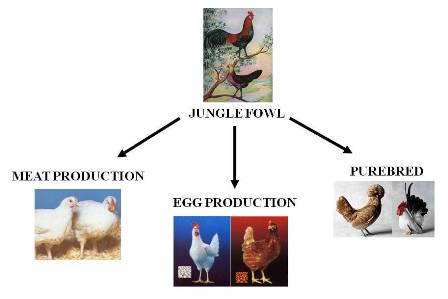Poultry Types: Chicken
Poultry Types: Chicken
ll the different breeds of chickens today can trace their origins back to the Red Jungle Fowl of East Asia.
Through generations of genetic seleciton, specialized breeds have been developed for meat (broilers) and eggs (layer). There are also dual-purpose breeds that are reasonably good in both meat and egg production, but not as good as the specialized breeds. There are also breeds develop strictly for exhibition.
Vocabulary
- Chicken is singular; chickens is plural
- Chick = young (baby) chicken
- Pullet = immature female chicken
- Cockerel = immature male chicken
- Hen = adult female chicken
- Cock/Rooster = adult male chicken
- Capon = castracted male chicken (requires surgery since the reproductive organs are internal)
- Bantam = chicken breed that is one-third to one-half the size of a standard breed. There are several breeds which have both standard and bantam breeds. There are also banta-only breeds
- Bantie = non-technical term sometimes used in place of 'bantam'
- Biddy = nontechnical term for a laying hen that is over one year of age
- Broody = a hen that is sitting on eggs (hers or someone else's) with the intent of hatching them
- Chicken tractor = portable cage for chickens on pasture. The chickens are allowed to scratch for bugs and weeds and to fertilize the area with their manure, and then they are moved to fresh pasture.
- Chook = Australian term for chicken. It has been used in the U.S. for chickens in a small flock.
- Cull = to remove a chicken from the flock because of productivity, age, health, or personality issues (i.e., overly aggressive or timid, egg eating, etc.)
- Mounting = term for when a rooster mates with a hen
- Peep = term for chick sometimes used by small flock owners
Note: Some people incorrectly believe that 'chicken' is the plural form of chick, as oxen is to ox. This is not the case - The word comes from the Anglo-Saxon word cicen, for which the plural is cicen-u. "Chick" is simply a contraction of chicken. Chicken can also refer to the meat coming from the bird so it is okay to say "I eat a lot of chicken" rather than "I eat a lot of chickens," which would change the meaning somewhat.
Chicken Trivia: About 4 million pounds of feathers are produced each year by the U.S. poultry industry. Ever wonder what happens to all these feathers?
Combs
There are different types of combs including: Single comb, rose comb, cushion comb, buttercup comb, v-comb, pea comb and strawberry comb. The most common is the single comb.
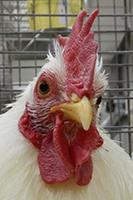
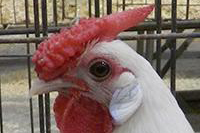
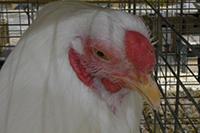
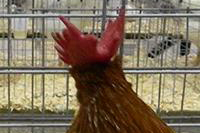
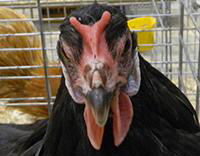
Males vs. Females
A common question is "How can you tell the difference between a male and female chicken?" There are distinct differences in adult chickens (known as sexual dimorphism) related to comb and wattle size, size of spurs, and type and shape of feathers.
Female Black Australorp
- Smaller comb and wattles
- Smaller spur
- Hackle feathers are more pointed
Male Black Australorp
- Larger comb and wattles
- Larger spurs with size varying by age
- Hackle feathers are longer and pointed
- Has long, pointed sickle feathers that cover the main tail feathers
- Has long, pointed saddle feathers over the back
It is much harder to sex young chicks, especially at hatch.
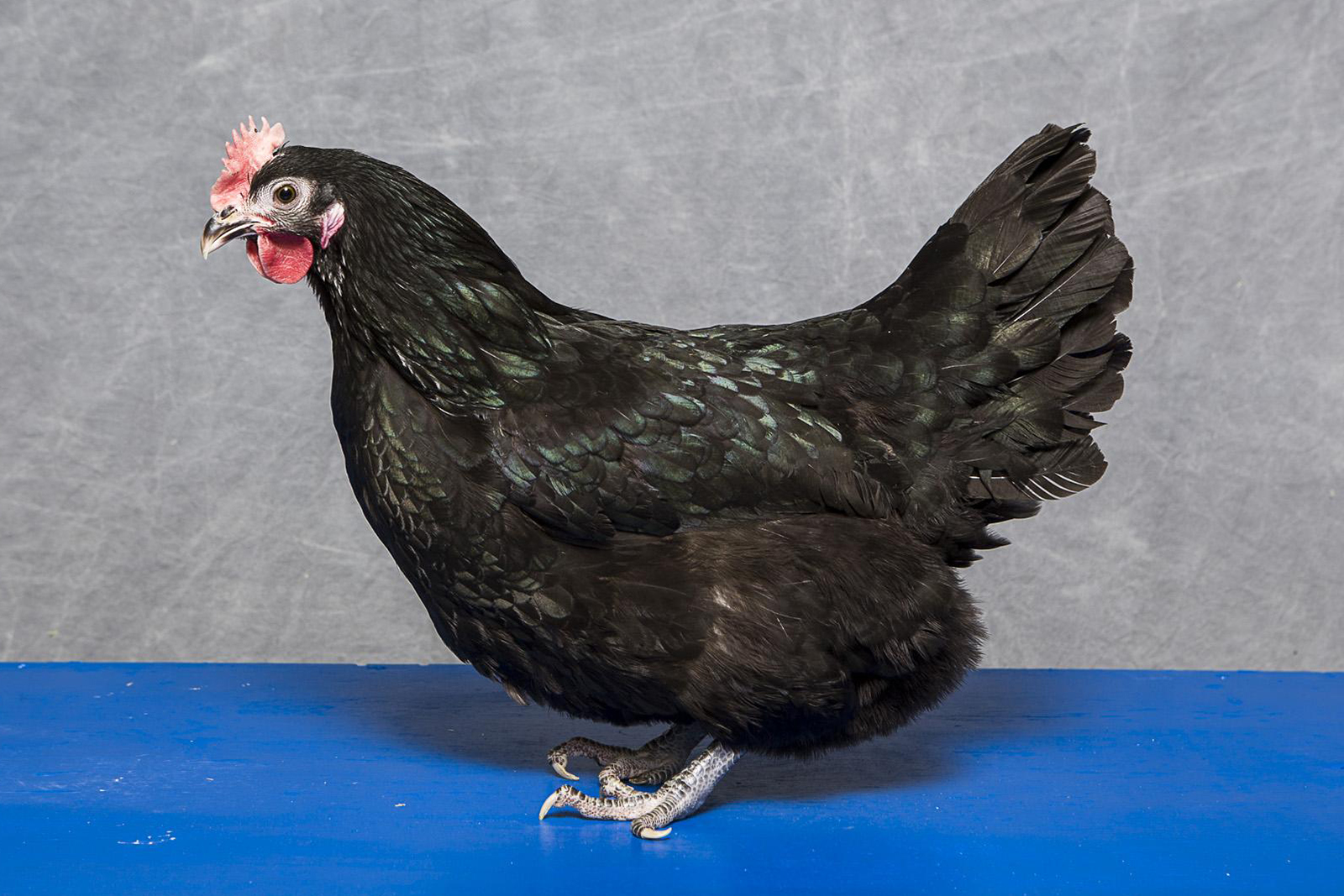
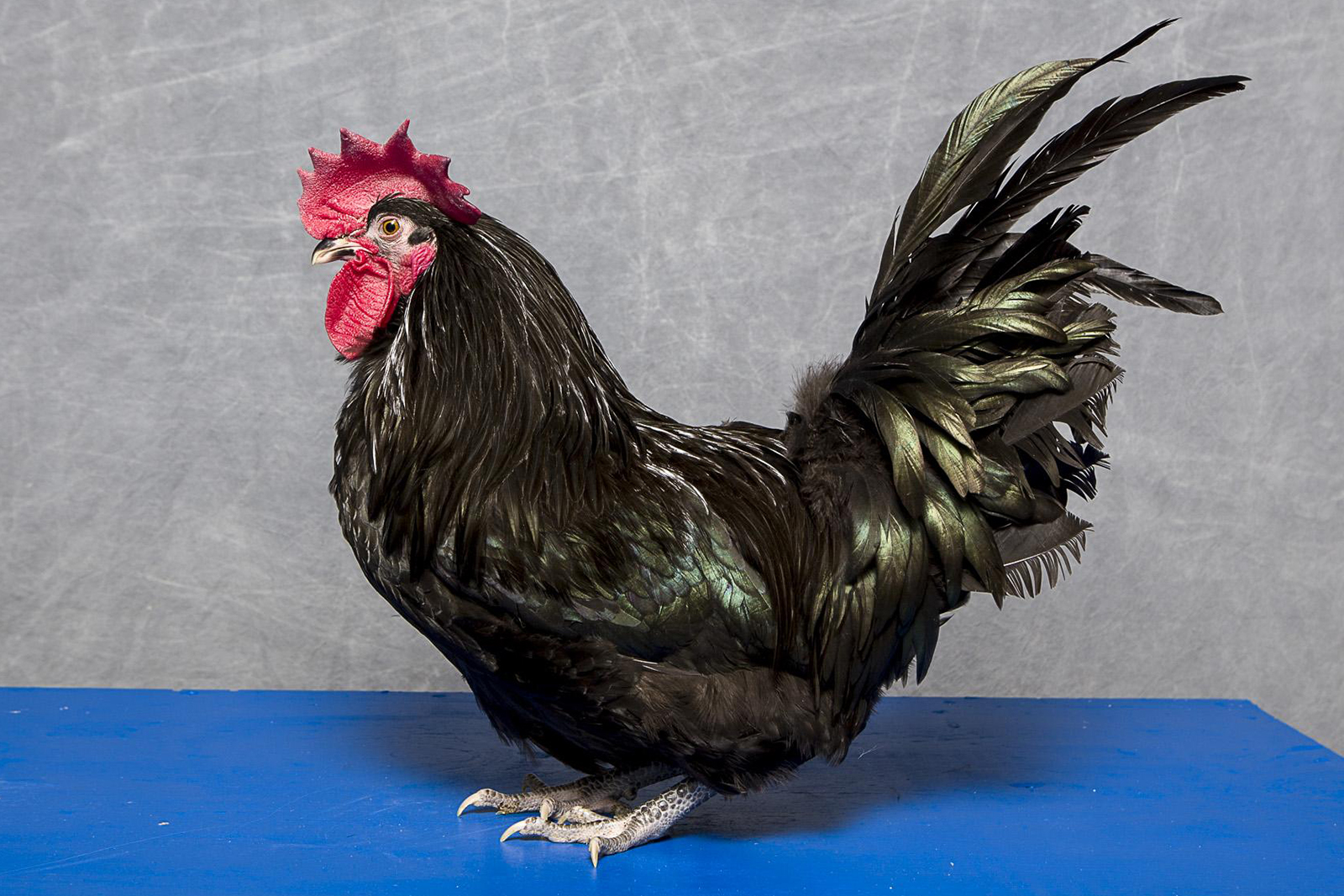
Breed Selection
Different breeds of chickens, as well as different strains within a breed, will vary in temperament and production capacity. The "perfect" breed for your operation will depend on your management and production needs.
Chicken breeds are grouped according to classes. The classification for large chicken breeds is based on their place of origin - American, Asiatic, English, Mediterranean, Continental and Other (including Oriental). Bantams are classified according to certain characteristics - whether or not they are game breeds, by their comb style, and by the presence or absence of leg feathering.
- Sex-Linked Crosses
- ASC-190: Selecting the Right Chicken Breed
- ASC-231: Breed Selection for a Small-Scale Egg-Production Enterprise
- The History of Chicken Breeds (University of Illinois)
- Pick-A-Chick (Livestock Conservancy)
- Definition of a Heritage Breed (Livestock Conservancy)
- Henderson's Handy-Dandy Chicken Chart: An alphabetical list of more than 60 chicken breeds with comparative information
- Poultry Genetics for Pastured Production (ATTRA)
- My Pet Chicken: A tool to help poultry newcomers determine which breed of chicken is best for them
